
A slightly different version of this article appeared in the October 2016 edition of Adventist World magazine. It appears again because this is the season when Christians around the world commemorate Christ’s resurrection. This article reminds us that, for Christians, death is nothing to fear.—Editors
Worldviews on what happens to us after we die are as diverse and numerous as the cultures that encompass our planet. Buddhists believe that after death they will be reincarnated as another being, and that this new life is dependent on past actions and deeds. Islam teaches that the souls of Muslims live on after death and wait to be judged for their actions in life on the day of judgment. Many evangelical Christians say that when people die they go directly to heaven or hell, depending on whether they have accepted Jesus as their Savior.
Seventh-day Adventist Christians base their beliefs about death solely on the Bible, which confirms that only God is immortal, and that when someone dies they are in “a state of temporary unconsciousness while the person awaits the resurrection”1 and the day of judgment. Bible calls this state a sleep (1 Cor. 15:51, 52; 1 Thess. 4:13-17; 2 Peter 3:4).
Another prominent world religion is animism. Although animistic beliefs are held largely in African countries, certain Western beliefs also give a nod to animism.2 Some estimates indicate that 40 percent of the world’s population is animistic.3 Animists believe that their ancestors continue to exist in a conscious state after death, and that they and other spiritual beings inhabit both objects and living beings. They deem that everything is conscious and has a soul,4 and that they have power over human affairs.5
Into this culture of animism Adventist Frontier Missions (AFM)6 worker Jason Harral, originally from Wyoming, and his family began sharing the love and power of Jesus. One of the methods Jason used to reach them was to break an ancient curse.
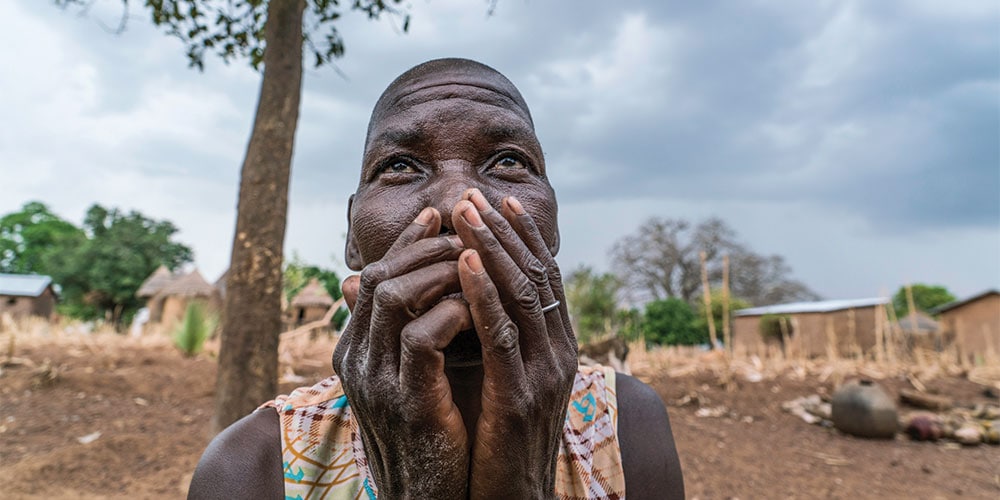
About 1915, near the beginning of World War I, among the Otammari tribe in the region of Natitingou in Benin, West Africa, someone presented a sacrifice to the spirit of his ancestor to curse the children of his tribe. At that time French colonists were forcing Otammari youth to fight in the war, and missionaries were sending them out of the region to attend school. The adults saw this as a threat to their culture, so the petitioner asked his ancestor to limit the children’s knowledge and skills so they would be useless to the colonists and missionaries. The tribal people believe this curse is still in effect today.
“They’ve tried to break this century-old curse, and they can’t,” explains Jason, who served in the Natitingou region from 2011 to 2016. “They feel hopeless.”
The Otammari people believe the curse continues to prevent them from advanced development and success in society, according to AFM workers in Benin. Indeed, statistics indicate that most Otammaris do serve in low-key positions.
“This curse causes them not to have any ambition,” says Ulrike (Uli) Baur-Kouato, an AFM worker from Germany who has served in the region for 18 years. “They don’t see a need to help their children get an education higher than primary school because they say, ‘It’s useless. We can’t go any further because this curse is on us.’ People don’t even try to get higher positions in society. Most of them just live from hand to mouth. They work their fields and just barely scrape by.”
Tribal spiritual leaders, or fetishers, have been unable to break the curse, Uli explains, because the one who pronounced the curse is dead and no one knows exactly what he said or what sacrifice he used. So according to tribal beliefs, the curse can’t be broken.
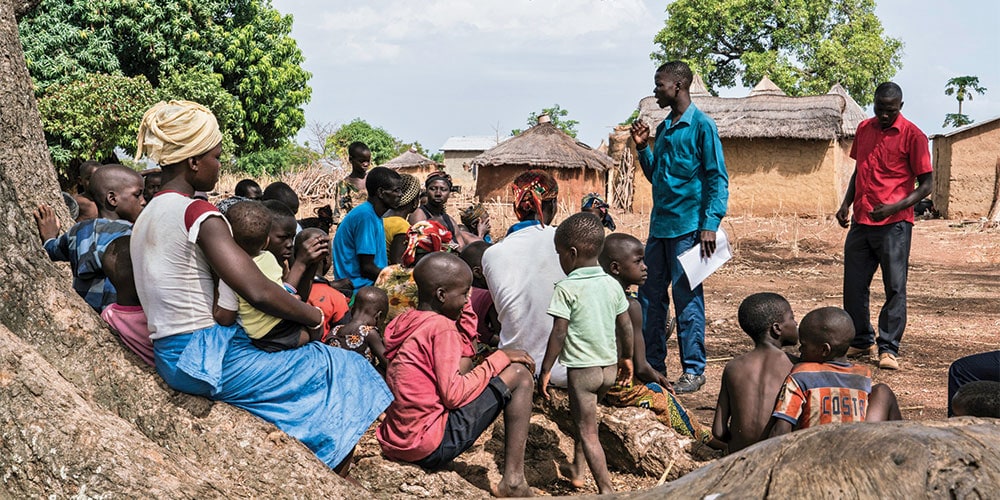
“That’s where our evangelists come in,” Jason says. “We’ve told them, ‘Look, we know Someone who was there. His name is Jesus, and He knows how to break this curse. His story is told in the Bible. Do you want to listen to this story?’ ”
He adds, “This is a very powerful tool to develop their interest in studying the Bible. We teach them about Jesus, the one who became a curse for us because He was hung on the tree and broke the original curse that occurred in the Garden of Eden. And if He broke that big curse, we tell them, He can break this little curse on your tribe, too.”
Jason and his wife, Magnhild (Maggi), from Norway, joined AFM in 2009 and served as AFM missionaries in Benin for five years. They and their three young children--Reuben, Kaia, and Petra--feel at home there.
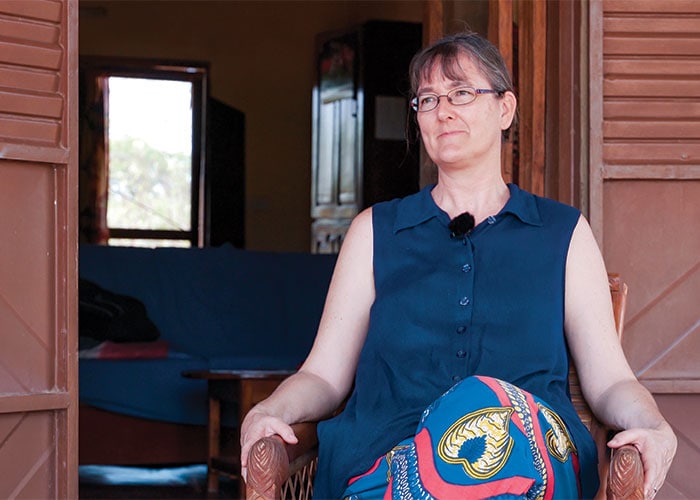
“In the beginning we went through culture shock and had some very hard times, but soon we felt that we belonged, that we were part of it,” Jason says.
Before Jason’s arrival in Natitingou—a city of some 100,000 people—Uli, along with AFM worker Suzie Baldwin, ministered in Benin for almost a decade. Both came in 1999. They first worked with another missionary family, who left in 2003. Uli then married a Beninese man, Toussaint, in 2007, so there were just the three of them before the Harral family arrived. They focused on getting to know the people, becoming familiar with the culture, helping with community needs, strengthening the local Adventist church, and developing trust.
“Toussaint and I have put a lot of effort into neighborhood ministry,” Uli says. “We’ve especially tried to help the children and the youth to develop, to study, and to advance in their education.”
When Jason and Maggi arrived, Maggi began assisting with community ministries. Since much of the relational groundwork had already been laid, Jason focused on evangelism. Jason’s main goal was to train local people who had already accepted Christ and joined the Seventh-day Adventist Church to become evangelists. He says the villagers would never as fully respond to AFM team members, whom they view as outsiders, as they would someone from their own culture who could speak their own tribal dialects. So he began weekly evangelism training sessions. About eight to 10 people, mostly men, attend, including AFM workers, local church leaders, and other interested individuals.
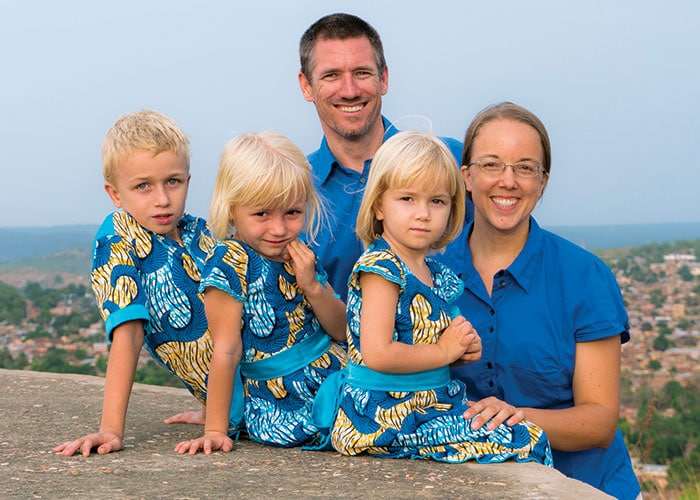
“We used to have more women come and be a part of it, but the women’s lives in Benin are very full,” Jason explains. “We don’t get as many women as we would like.”
To be sensitive to the Otammari culture, the group developed Bible studies that present the gospel in a way that is relevant to the people and that are based on the curse still plaguing the community. Studies begin with a strong focus on Bible stories, then become more thematic, many dealing with societal issues such as polygamy and alcoholism. Eventually they branch out into leadership development.
Three local men who attend the training sessions and are playing integral roles in sharing the gospel message in surrounding villages are Hyacinthe Tianati, Jean Akolim, and Charles Korrobessaga. Hyacinthe, who has served as an evangelist for many years, lives in Boukoumbé, about 30 miles (50 kilometers) from Natitingou. He leads the Boukoumbé church and coordinates AFM’s evangelistic meetings in several nearby villages. Jean and Charles teach and give Bible studies in Natitingou and other nearby villages.
“Hyacinthe goes to the villages as an Otammari man saying, ‘I grew up in this culture, under this curse. I want to see our people set free from this curse. I’m free from the curse today because of what Jesus has done.’ The people can hardly resist this,” Jason says. “Hyacinthe cannot tell this story without starting a group of people wanting to study the Bible, wanting to meet every week. It’s so powerful. Now he’s training young people, young men, who are going with him and learning how to do evangelism and how to tell this same story. It’s a beautiful thing!”
Jean, originally from Togo, attended secondary school in Boukoumbé and learned the local language. He now lives in a small mud house in Kouaba and holds weekly Bible studies and Sabbath worship services in his home and under trees in nearby villages. The first time Jason attended one of Jean’s study classes he says he was both amazed and thrilled.
“That was a reward for me, seeing Jean teach, seeing the energy,” Jason says. “He was sitting there in front of 40 or 50 people explaining to them the origin of evil. As I watched him I thought,
He’s got it! I’ll have that image with me for the rest of my life.”
“The villages where Jean has been working for more than a year now have been resistant to religions other than their own,” Uli notes. “Churches that other religious denominations tried to establish there have since been closed or abandoned. People predicted that Jean’s meetings wouldn’t last more than a few months, but they are still going strong. The Lord is definitely blessing.”
The local evangelists’ insight and knowledge of the culture helped open the doors when they initially entered the villages to share the gospel.
They first approached the village chiefs to ask permission. “The chiefs said OK,” Jason explains, “then when the people gathered together the evangelists talked about the curse and how the Word of God tells how the curse can be broken. So they really had a captive audience. No one could say, ‘Don’t do this in our village,’ because the chief was part of it and had accepted it.
“There was some initial resistance because the villagers were afraid that the evangelists were there to destroy their culture,” Jason adds. “But Hyacinthe was very tactful and said, ‘We don’t want to destroy what is good in your culture. And we’re not going to force anyone to do anything. We’re not going to break any altars. We’re just presenting a message; and it’s your choice whether to accept it.’ So that calmed them down.”
Broaching the subject of religion among the Otammari isn’t very difficult, Uli notes. Describing the people as “open and friendly and joyful,” she says it’s rare to find atheists in Africa.
“Even people who are not Christian know that God is there,” she says. “It’s a very religious people. In Benin some people are Muslims, some are Christians, but most are animists. Many mix their beliefs into their own system. So it’s not difficult to talk about faith. But when it comes to Adventist biblical doctrines, there are certain lifestyle issues that are extremely difficult for people to adopt, such as not drinking alcohol. Alcohol is a very big problem in Benin.”
Animism has a strong hold in the region, Uli explains, because Otammaris believe that everything surrounding them has a living soul—not only people and animals, but also places, rocks, and all of nature. They say that when a person dies, the soul continues to live on and to some extent influences daily life.
“When someone gets sick, when someone dies, when they have a bad harvest—everything that is happening has a reason in the spiritual, or unseen, world,” Uli says.
Uli believes, however, that the Lord is blessing the efforts of the AFM team and that they are making a difference.
“When AFM missionaries go into a country, they are asked first to live with the people and observe them; to study the language, the culture, the traditions, and the religion of the people,” she says. “Once you have that knowledge and have built friendships and trust, you can then find the best ways to touch their hearts.”
The AFM project in Benin is almost complete and will likely phase out within the next two years. The local full-time evangelists will continue, supervised by the local pastor and the mission headquarters. Uli and her husband will remain in Africa.
“I fell in love with Africa and the people here, and with an African,” Uli says. “Toussaint and I have decided that we will continue to use our gifts to work with the children and youth in Natitingou.”
Their goals include building a home for orphaned and abandoned children on land they personally own.
Suzi also married a Beninese man, Fidel, and transferred from Natitingou to Tanguiéta in 2014, where they have started a new AFM project. Following the interviews in 2016 for this article, Jason and his family left Benin and moved to Norway, where they are preparing to return soon to a different region of West Africa. It was not, however, an easy decision for them to make.
“In some ways we could have stayed there forever, but the work was wrapping up, so we chose to move on,” Jason explains. “It wasn’t because of a desire to leave there; it’s just that the time had come to leave the work with others.”
Jason and Maggi’s prayer, however, is that the Lord will continue to bless the people of Benin, that His message of love will touch their hearts, and that the light of truth from His Word will shatter the curse and the darkness of animism.
Note: Since this article was first written and printed in the October 2016 Adventist World, and after many months of attending meetings and thorough Bible study, 14 tribal villagers have been baptized.
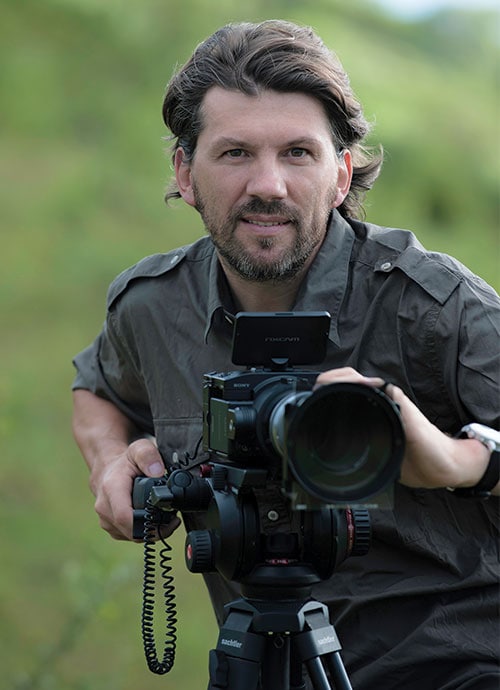
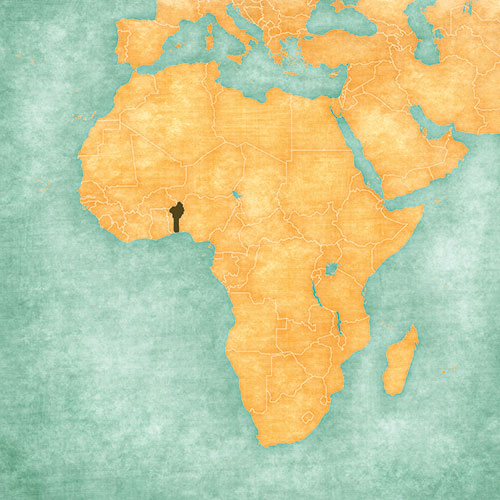
Benin is 43,483 square miles (112,622 square kilometers) in size; borders Niger, Burkina Faso, Nigeria, and Togo; and has a population of about 10 million. Almost half of the people are under 15 years old, with most living in the southern and central regions. The climate is tropical, with both rainy and dry seasons. Porto-Novo in southeastern Benin is the capital, but the seat of government is in nearby Cotonou, Benin’s largest city.
Although the national language is French, more than 50 languages and dialects are spoken.
About half the population earn their living in agriculture, although the lack of passable roads in rural areas makes it difficult to transport agricultural products to market. Men do the heavier farming tasks such as clearing land, but women help plant, harvest, and process the food. They also carry wood and water and take care of the many household tasks. Women received legal equality status in 1977, but this is often ignored in practice. About 24 percent of women are literate. Families arrange most marriages, but it’s becoming more common for individuals to choose their own spouse. Polygamy continues to be an acceptable practice.
Cooking is mostly done outside, even in urban areas, and many homes don’t have refrigeration. Basic meals consist of a starch, such as yams, rice, or corn, prepared as a mush and eaten with a sauce containing vegetables and meat or fish. Many varieties of tropical fruits are also available.
About 30 percent of the population is Christian (mostly Roman Catholic), 25 percent is Muslim, and the rest follows indigenous belief systems in which ancestors are considered part of the community after death. Both Muslim and Christian beliefs in that region, however, are mixed to some degree with animism.*
* Based on information from www.beninembassy.us/about-benin.html, www.everyculture.com/A-Bo/Benin.html, and www.iexplore.com/articles/travel-guides/africa/benin/history-and-culture.
Sandra Blackmer is an assistant editor of Adventist Review. This article is based on interviews conducted by Blackmer, as well as video footage and interviews done by Henry Stober, a professional videographer and photographer living in Germany.